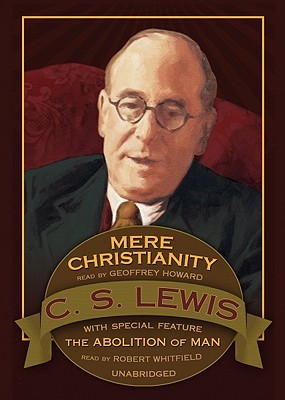- Biblia
- Leer la Biblia
- Versiones de la Biblia
- Verso del dia
- Planes de lectura
- Versos por tema
- Books of the Bible
- Imágenes De La Biblia
- Estudio
- Comentarios
- Concordancias
- Diccionarios bíblicos
- Enciclopedias bíblicas
- Sermones
- Bible Atlas & Maps
- BP Wiki
- Devocionales
- Devocionales de hoy
- Light of the World
- Todos los devocionales
- Inspirational Quotes
- Más
- Picture Quotes
- Videos
- Inspirador
- Estudio Bíblico
- Lo que dice la Biblia
- Bible Q&As
- Daily Bread
- Bible by Genre
- Bible Stories
- Random Bible Verse
- Comunidad
- Store
Mere Christianity: Abolition of Man (Bonus Feature)
by C.S. Lewis
Mere Christianity is C. S. Lewis' forceful and accessible doctrine on Christian belief. First heard as informal radio broadcasts and then published as three separate books--The Case for Christianity, Christian Behavior, and Beyond Personality--Mere Christianity brings together what Lewis sees as the fundamental truths of his religion.
Rejecting the boundaries that divide Christianity's many denominations, C. S. Lewis finds a common ground on which all those who have Christian faith can stand together, proving that "at the center of each there is something, or a Someone, who against all divergences of belief, all differences of temperament, all memories of mutual persecution, speaks with the same voice."
This recording also includes Lewis' erudite essay "The Abolition of Man," in which he eloquently argues for a better standard of public education that would include reading and writing lessons grounded in moral reasoning.
Rejecting the boundaries that divide Christianity's many denominations, C. S. Lewis finds a common ground on which all those who have Christian faith can stand together, proving that "at the center of each there is something, or a Someone, who against all divergences of belief, all differences of temperament, all memories of mutual persecution, speaks with the same voice."
This recording also includes Lewis' erudite essay "The Abolition of Man," in which he eloquently argues for a better standard of public education that would include reading and writing lessons grounded in moral reasoning.
BUY NOW
Audio CD, 6 pages
Published May 1st 2006 by Blackstone Audiobooks
tags: audiobook
Suscribir
© 2025 Bibleportal.com Reservados todos los derechos.

Clive Staples Lewis was born in Ireland, in Belfast on 29 November 1898. His mother was a devout Christian and made efforts to influence his beliefs. When she died in his early youth her influence waned and Lewis was subject to the musings and mutterings of his friends who were decidedly agnostic and atheistic. It would not be until later, in a moment of clear rationality that he first came to a belief in God and later became a Christian.
C. S. Lewis volunteered for the army in 1917 and was wounded in the trenches in World War I. After the war, he attended university at Oxford. Soon, he found himself on the faculty of Magdalen College where he taught Mediaeval and Renaissance English.
Throughout his academic career he wrote clearly on the topic of religion. His most famous works include the Screwtape Letters and the Chronicles of Narnia. The atmosphere at Oxford and Cambridge tended to skepticism. Lewis used this skepticism as a foil. He intelligently saw Christianity as a necessary fact that could be seen clearly in science.
"Surprised by Joy" is Lewis's autobiography chronicling his reluctant conversion from atheism to Christianity in 1931.
... Show more